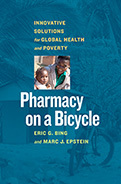 Pharmacy on a Bicycle demonstrates how, even in the most of dire circumstances, entrepreneurs can develop cost-effective, sustainable, innovative solutions that have the potential for replication and scale. Not only are the examples inspiring and instructive, but the IMPACTS framework (Bing and Epstein’s framework) has applications that extend well beyond global health. —Professor J. Gregory Dees, cofounder, Center for the Advancement of Social Entrepreneurship, Duke University
Pharmacy on a Bicycle demonstrates how, even in the most of dire circumstances, entrepreneurs can develop cost-effective, sustainable, innovative solutions that have the potential for replication and scale. Not only are the examples inspiring and instructive, but the IMPACTS framework (Bing and Epstein’s framework) has applications that extend well beyond global health. —Professor J. Gregory Dees, cofounder, Center for the Advancement of Social Entrepreneurship, Duke University
Millions of people are dying from diseases that we can easily and inexpensively prevent, diagnose, and treat. Why? Because even though we know exactly what people need, we just can’t get it to them. They are dying not because we can’t solve a medical problem but because we can’t solve a business logistics problem.
Pharmacy on a Bicycle introduces a unique model for better global health. It saves more lives while saving money by using innovation, entrepreneurship and building on existing infrastructures. Authors Eric G. Bing and Marc Epstein come at the global health care crisis from two very different backgrounds—Epstein is a business school professor, Bing is a physician with an MBA. Combining Eric’s extensive work in global health with Marc’s work in designing and implementing solutions to challenges faced by business and nonprofit organizations has produced a powerful guide to action grounded in the best academic research and managerial practices.
The authors provide over 100 examples from organizations that are already using innovative business solutions to deliver and scale health care to the poor in more than 35 countries throughout Africa, Asia, and Latin America. Some of these best practices include:
-
Improving access to health services in rural communities by using an army of micro-entrepreneurial health workers based in and trusted by these communities. The health workers make a small profit to support their families while providing needed health products and services
-
Dramatically lowering costs of complex procedures, including open heart surgery and cataract surgery, by using factory-like processes to increase efficiency
-
Increasing the use of simple, yet life-saving solutions, such as insecticide treated bed nets, by making them culturally appropriate and acceptable
-
Improving the quality of health services through the use of simple checklists to ensure consistency and completion of all tasks
Mark Kramer, Senior Fellow Harvard University, says about the book, “…governments, companies, and NGOs must embrace a new paradigm to convert medical discoveries into real-world solutions. Bing and Epstein’s elegant framework for action provides clear guidance and a multitude of compelling examples to demonstrate that the power to save lives is already in our hands.”
---------- s'abonner aux lettres et newsletters d'Esteval Editions ----------


